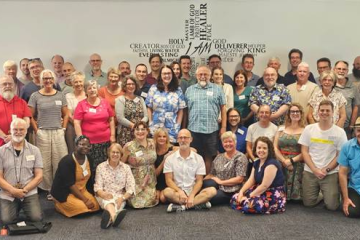At the Open Baptists Gathering three weeks ago, our speaker, Steve Frost, the founder and director of Horizons Family Law Centre, told a story about walking through Parramatta Square, the revamped city centre of Paramatta, where there are usually various people handing out leaflets and being attracted to one because, he said, “the graphic design on it wasn’t terrible,” (although he acknowledged actual graphic designers might not agree) and because it made a universal appeal to everyone, “You might be a Catholic, a Protestant, an Atheist, a member of some other religion, but God says…” He couldn’t wait, he said, to see what God was saying to everyone, so he opened the leaflet and the first heading, in giant bold letters, read, “You’re a sinner.” (To be fair, Steve said, it finished with a full stop, not an exclamation mark, so that softened the blow.) He scanned down and the next thing, he said, that apparently God wants everyone to know is – “You must repent.” Then, “Good works cannot save you… The unbeliever is a fool…” And finally, “Jesus is the only way to heaven.”
He then paused… “Let me,” he said, “for a moment, not be a jerk. Some incredibly good hearted person had given up their time that day so I could be given something they understood to be good news… And Holy Spirit is wildly creative, and I am open to the possibility someone might receive this and it opens a door to new life. But,” he said, “the next thing I’m going to say reveals I am still a jerk. I’m pretty in on the whole Christian gig, but having got this… I was less in.”
He flicked through the tract to see what was expected of him in response, and at the end it said, “Admit you are a sinful person in need of the Saviour and receive Jesus Christ as your only hope.” It sounds like a good thing to do, he said, but as the only response to all God communicates to us, it struck me, “as a singularly narrow ask.”
It was an engaging story and a relatable one because we had had our own version of this story at church camp where someone tried to convert our Steve on the streets of Ulladulla with a tract written in a very similar vein.
It is the kind of experience, as Steve Frost says, that makes you feel you are much less in on the Christian gig than you are, or, as Sarah Bessey describes in chapter 14 of Field Notes for the Wilderness, a ‘not this’ moment; I am not part of this, I don’t belong here, I reject this as unhealthy, untrue, unable to bear good fruit in my life and it becomes something you are ‘against’.
I remember very clearly a ‘not this’ moment in my life, during my early twenties, at an evangelism training conference run by an organisation whose people and theology and methodology I trusted, but who were playing politics at the time, trying to keep the Sydney Anglican Diocese on side, so they’d invited their head of evangelism to speak and this person spent the conference hammering home to us that the main message of the gospel is, as the tract said, “You are a sinful person in need of the Saviour and must receive Jesus Christ as your only hope.” The problem is, the speaker said, that people no longer know they are sinners, so our main task as Christians, our main task as Christians, is to convince people that they are sinners!
Like Steve, my feeling, in that conference in my mid-twenties, was that, as a response to all God was communicating, this was a singularly narrow ask. It seemed to me, at the time, that to focus on telling people they are sinners was to ignore the great
brokenness of the world, so my expression of faith became one of social justice, rather than this narrow evangelical expression faith. It was through being aware of the poor, through advocating for overseas aid, through protesting against corporate greed or government inaction that faith was to be expressed.
However, Steve said, there is a deeper, underlying reality in much of our religious systems and frameworks – whether we’re sacrificing goats or telling sinners they have sinned or promoting the right social justice causes – that comes from a place of superstition that if we can only find the right keys and turn them in the right directions good things will flow…
Lots of Christians, he said, would never deal out the cards of the gospel in the way these tracks do. They would say, OK yes, you repent and believe, but then, you are assured of God’s love and forgiveness, and then, you go and do “whatever the bundle of things our church talks about every Sunday as the markers of right Christian living.” That kind of presentation, Steve said, “is wildly common.”
What I hear Steve saying is that when we have a ‘not this’ moment or we identify what it is that we are against, we can simply end up exchanging one very similar set of cards for another. Bessey writes, “turning away [naming what you are ‘against’] is a good start, but it isn’t going to sustain us over the long haul. Naming what you are turning toward… [naming what you are ‘for’] is a rebellion against the broken story itself.”
As Steve put it, the broken story is that humanity needs to do something before God is favourably disposed toward us. That God is ‘against’ us. But the message of the Bible is that this message simply isn’t true. God is ‘for’ us – not ‘against’ us. What I see Jesus doing in the Gospels, Steve said, is going around first century Palestine easing the cards of religion out of people’s hands and replacing them with a completely different deck. Saying that fundamentally – before anything else and before everything else, you are loved. You are cherished. God loves you. And what comes next in that relationship is a “potent mixing of believing and doing, repentance and faith, …that in gradual beautiful world-transforming ways grows in you a new kind of life… a new kind of life that will last forever.”
Something else happened at that evangelism conference. After that lecture that enabled me to clearly name what I was ‘against’, I went out into a kind of wilderness around the conference centre and was praying, and had a profound sense that my humanness did not alienate me from God. I remember putting my hands on the hard baked red earth, warm in the sun, and thinking about the words Paul quotes in Acts 17, “In God we live and move and have our being.”
This is gospel – that the love of God, the good news of Jesus is for all people (without qualification as we like to add here at CBC. God is for us. God loves us. And that is the start, the foundation, of our relationship with God, and I love the way Steve put it, that through that relationship in a, “potent mixing of believing and doing, repentance and faith…in gradual, beautiful, world-transforming ways,” a new kind of life grows.
Our reading from John is the lectionary reading for today, as we approach Easter, but it was interesting to read it this week in the light of this framework – of being ‘for’ not just ‘against’, and thinking about the dynamics of Judas’ and Mary’s interaction, of Mary’s extraordinarily costly act (300 denarii was a labourer’s yearly salary) and reputationally costly act (anointing Jesus’ feet, wiping Jesus’ feet was one thing, but
wiping them with her hair is quite something) and Judas’ outcry that the money should have been given to the poor (though the text gives him a secondary motivation).
It seems to me Judas could be any of us, against Mary’s costly outpouring because we have adopted and claimed a position of being ‘against’; and we can justify it with pious language and perhaps even be blind to our own mixed motivations.
On the other hand, Mary, is demonstrating she is completely and utterly ‘for’ Jesus. She demonstrates that she is even turning toward the unthinkable path ahead of him, his death and burial. Jesus, himself draws this connection. And that she is turning toward the kind of discipleship Jesus will model in the next chapter by washing his disciples’ feet. The same verb for “wiping” feet is used in John only in these two scenes (12:3; 13:5). As New Testament scholar, Gail o’Day writes, “The power of the witness of Mary’s discipleship in this story is that she knows how to respond to Jesus without being told. She fulfills Jesus’ love commandment before he even teaches it.”
It is this kind of being ‘for Jesus’, of turning toward the path of discipleship that will, as Jesus says, in grardual, beatiful, world-transforming ways help the poor. The words here come from Deuteronomy 15:11 which commands ongoing generosity toward the poor. It is this kind of being ‘for’ Jesus, of turning toward the path of discipleship that will, in the words of Sydney Carter’s song, “Wash all the sorrow away…wash all the sorrow away.”
“The path of the righteous,” Proverbs 4:18 says, “is like the light of dawn, which shines brighter and brighter until full day.”
“What are we journeying toward,” Bessey asks, “out here in the wilderness?
I [want] to journey toward my best hopes, not my worst fears. I want to journey toward redemption. Toward love, joy, peace, patience, kindness, goodness, faithfulness, gentleness, even self coontrol. Toward compassion and empathy. Toward justice and reneal. Toward equality and inclusion. Toward celerbation and sorrow. Toward creation and possibility. Toward Jesus. Toward the margins where God is already quite at home. Truly toward one another…. Toward our own self. Toward the great, abiding lovingkindness that even now faithfullyu holds us all right through the night.”
Can I invite you to take a moment to reflect on what it is that you are ‘for’; that you are journeying toward, as you think about this path of following jesus, this path that, “like the light of dawn, shines brigher and brighter until full day.”
And then, as we sing ‘Be thou my vision’, if you would like, you can come and write on the whiteboard one word or phrase to describe what you are ‘for’; what you are journeying toward.


